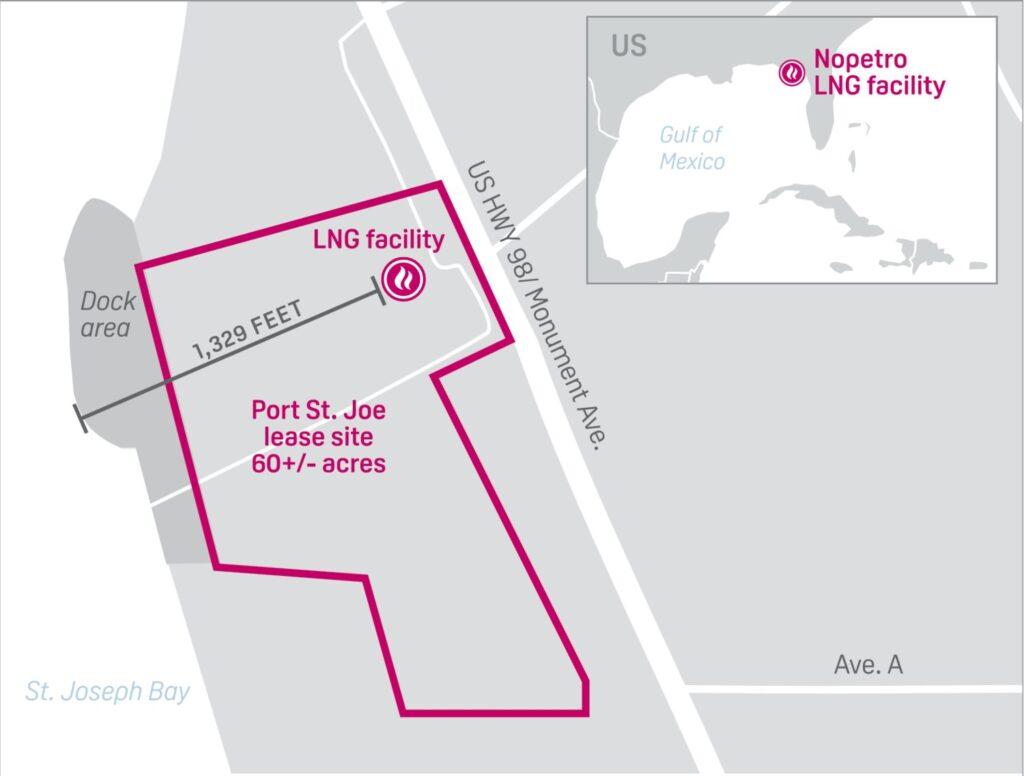St. Joe Company states LNG project ‘not moving forward at this time’ — opponents, proponents stress project may not be ‘dead’
According to a transcript from the St. Joe Company’s annual shareholders’ meeting, a controversial small-scale liquefied natural gas project that has stoked tensions within the community for nearly a year will not be moving forward at this time.
In that meeting, held May 16, St. Joe Company President and CEO Jorge Gonzalez responded to a direct question from an “unidentified participant,” who asked for updates on a proposed LNG export terminal project to be constructed on St. Joe Company land by Miami-based Nopetro LNG llc.
“We had a company that was proposing an LNG facility on a portion of our property, the old paper mill site, the port in Port St. Joe,” said Gonzalez, according to the transcript. “We issued them a license agreement for them to do their due diligence. As you can imagine, with anything having to do with energy, due diligence is pretty robust. It takes many years. So we never signed a lease with them.”
“… We extended the license agreement a couple of times, and they finally came to us and said they’ve completed their due diligence and they’re not moving forward with the project at this time. So the license agreement expired.”
But both members of an organized opposition to the LNG project and county officials who support it expressed that they were not ready to declare the project “dead.”
Members of the Gulf County Citizens’ Coalition for a Healthy Future, vocal opponents of the LNG project, stated that they still see the need to advocate for the type of “clean” industrial development they envision for the community going forward. They point out that the comments in the transcript leave open the possibility of the development of an LNG plant at the site in the future.
“The St. Joe Company transcript isn’t definitive, as it only states that Nopetro is ‘not at this time’ pursuing building an LNG export terminal in Port St. Joe,” said Tyson Slocum, Energy Program Director for Public Citizen, a progressive non-profit consumer advocacy organization and think tank based in Washington D.C. that has been working closely with GCCCHF in their opposition efforts. “The statement leaves open the possibility that the St. Joe Company will sign lease agreement with Nopetro in the future, or with a cement manufacturer, or toxic waste pipeline company or any other polluting industry.”
“Until the St. Joe Company agrees to meet with local residents to discuss plans for sustainable development for the site of the former paper mill, this saga is unfortunately not over.”
County Administrator Michael Hammond, a vocal proponent of the LNG project, also stated that he felt there was potential for Nopetro’s plans to move forward.
“I don’t have any new information, but Nopetro had a license agreement. They never had a lease. They let it expire,” he told The Star. “From what my sources told me, they were certainly willing to renew when it picked up, but right now they didn’t have their financing lined up and they didn’t have their clients lined up.”
“So, I don’t know that it’s dead, so I certainly don’t want to say that, but it has not been moving forward for months.”
A public meeting hosted by the Gulf County Citizens’ Coalition for a Healthy Future on June 23 was attended by about 230 people, who gathered in the Centennial Building to hear arguments made by Slocum and other parties.
At the time of the meeting, the St. Joe Company’s shareholders’ meeting transcript was unknown by organizers. But several alternative developments to the LNG project were offered by presenters nonetheless.
“The EPA has done a review that in a preliminary sense (the site) is suitable for solar,” said Slocum. “What that means it is would qualify for the EPA to take on a feasibility study to examine the technical aspects of whether or not that land is feasible for a solar farm, which could provide significant revenue to the city and county.”
Nopetro’s efforts stirred up tensions in the Gulf County community in the last several months of 2022 after it was widely circulated that the company had been declared exempt from the Federal Energy Regulatory Commission’s jurisdiction.
The proposed Port St. Joe facility, if constructed, would filter natural gas brought in by the St. Joe Gas Company for impurities and water before cryogenically cooling it to its liquid state, transporting it via truck to the port, about 1,400 feet from the proposed site, and shipping the LNG overseas.
The plant “would consist of up to three liquefaction trains that would liquify up to 3.86 billion cubic feet per year of natural gas for export,” according to Nopetro’s petition with FERC.
Public Citizen, along with several representatives from the local community, have filed a lawsuit seeking to ensure federal oversight over the proposed project.
The lawsuit, which was filed on Sept. 27, 2022, confronts a March, 2022 ruling by FERC declaring the proposed plant to be outside the scope of their jurisdiction due to its unique design.
Six months later, FERC filed their response in the case, defending their refusal to assert jurisdiction over the facility.
In a brief filed March 20, FERC urges the D.C. Circuit Court to affirm the commission’s March 2022 finding that the facility does not qualify as a liquefied natural gas terminal under the Natural Gas Act.
FERC based this determination on the project’s unique design, in which the LNG would have to be transported by truck to the port itself.
Nopetro also filed a brief with the court in March, which Slocum and members of the GCCCHF said is evidence that they may still be planning to move forward with the project.

Competing visions for the town’s future development
LNG produces 40% less carbon dioxide than coal and 30% less than oil, which makes it the cleanest of the fossil fuels. The United States is the world’s largest exporter of natural gas, with an increasing amount of it having been condensed into LNG.
Research has shown it is among the safest of the fossil fuels to produce and transport, though it is not devoid of risks.
During the June 23 public meeting, Melanie Oldham, a resident of Freeport, Texas, spoke to those gathered about her community’s experience following a large explosion at an LNG facility on the town in June of last year.
“We learned first hand how dangerous LNG can be,” she said. “… You do not want LNG if there’s a community anywhere near it.”
But beyond the risk factor, opponents of the plant stress that the reintroduction of heavy industry to the community would undermine existing redevelopment efforts.
In 2002, portions of Port St. Joe were declared brownfield sites as a result of contamination from the shuttered St. Joe Paper Mill. The EPA defines brownfields as “real property, the expansion, redevelopment, or reuse of which may be complicated by the presence or potential presence of a hazardous substance, pollutant, or contaminant.”
Over the last year, the community has received $850,000 in grant funding from the EPA to clean up the area and spur redevelopment. Now, some residents are wary that the reintroduction of industrial activity might affect their redevelopment efforts.
“The Port Authority, the county commissioners and the St. Joe Company want the port to reopen and basically take us back to the 1980s and 70s,” said Dannie Bolden, one of the leaders of the opposition to the LNG project.
“But that isn’t the future that we need for this community. We need jobs, but we need clean jobs that don’t bring pollutants.”
But representatives from the county argue that along with increasing the tax base for both the county and city and bringing in at least a dozen jobs, the proposed plant represents a potential opportunity to diversify the local economy.
In September, 2022 the Board of County Commissioners unanimously voted to send a letter to the St. Joe Company, expressing their willingness to “(offer) full support to The St. Joe Company and the community and various business leaders in their effort(s) (leading) to establishing the construction and operation of an LNG plant in Gulf County.”
County Commissioner Patrick Farrell told the Star after a Jan. 14 meeting hosted by Public Citizen that he would like to see what opportunities the LNG facility could provide.
“Instead of slamming the door shut on everything, let’s see what’s out there and what the possibilities are,” he said.
“People have kids or grandkids that are going to have to move out of here unless they want to wash dishes, or wait tables or clean houses. That doesn’t make a stable community. That makes a transient community.”
Records obtained by Public Citizen show that in a conversation held between Gulf County Economic Development Director Jim McKnight and County Administrator Michael Hammond, McKnight indicated that the plant’s “first phase” was expected to bring in 12 jobs.
But Hammond told The Star last year that the number could be much larger if ancillary industries, such as port or transportation-related jobs, are included in the figure.
The LNG project or any similar development would need to pass through the city’s approval process for new developments, which involves a series of public meetings, before it would be permitted to move forward.
No county officials were present at the June 23 meeting. Port St. Joe Mayor Rex Buzzett was in attendance, but did not speak, though he publicly declared opposition to the LNG project while running for reelection earlier this year. City commissioners Scott Hoffman and Steve Kerigan have also publicly opposed the project.
At this point in time, with the LNG project halted, members of the community are now calling for public discussion with the St. Joe Company and the local government about the overall direction of Port St. Joe’s future development.
“It’s encouraging to see that someone asked the St. Joe Company a question and they got an answer,” said Bolden. “Now we are calling for them to open up a discussion with the community so that we can all move forward on the same page.”
Upon request for comment, the St. Joe Company stated they could not provide additional information other than what appeared in the shareholders’ meeting transcript at this time.
Nopetro did not respond to a request for comment in time for publication of this article.



Thank you for reporting on this subject. It is imperative that we stay informed regarding LNG. I oppose this plant in our communities.
Thank you for the fact base article.
It’s critically important. Maybe some people need to get better educated before that attempt to destroy our safety and economic future with dirty industry. Sacrificing our current growing success with sectors that are not a fit with our community isn’t economic development, it’s economic suicide.
Thank you, please keep reporting on this crucial plan for our community. I oppose this plant or any industry that will do harm to our natural resources, our community and the people that live and visit here.